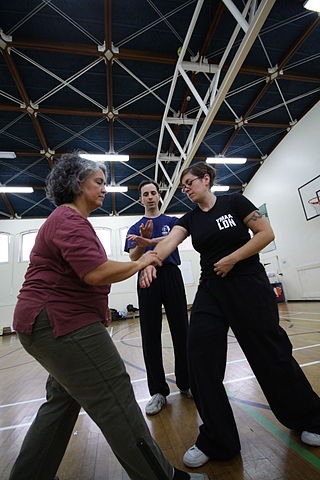This article has multiple issues. Please help improve it or discuss these issues on the talk page . (Learn how and when to remove these messages)
|
The learning circle is a mechanism for organizing and honoring the collective wisdom of a group.
This article has multiple issues. Please help improve it or discuss these issues on the talk page . (Learn how and when to remove these messages)
|
The learning circle is a mechanism for organizing and honoring the collective wisdom of a group.
Learning circles are present in many indigenous cultures. For example, in some Native American cultures, councils of elders come together to understand problems in a spirit of shared community in "wisdom circles".
The term learning circle has been used to describe group efforts with clear links to social change. Over time and across countries, civic organizations, neighborhood communities, trade unions, churches and social justice groups have used the idea of learning circles to empower their members to make choices and take action. Groups have used the term study circle or learning circle to refer to a form of adult education. For example, Educators for Community Engagement, [1] found that learning circles—with their principles of equal participation, reciprocity, and honoring of collective wisdom—embody the democratic principles of service-learning partnerships. They use learning circles, rather than more traditional forms of group meetings, to structure their annual conferences.
Primary teachers use a simple form of learning circles when they gather the students at the rug for "circle time". Many educators are using learning circles to connect students from around the world. [2] [3] [4] Among the goals of this activity are helping students to develop trust and respect for diversity of experience, and fostering both listening and speaking skills among peers.
Researchers have used learning circles as a form of professional development to improve their practice. A similar term, quality circle , was used in the 1980s to characterize the successful practice in corporate settings in which the hierarchical boundaries between workers and managers are flattened to encourage participatory management and team leadership. Quality circles, originally associated with Japanese management and manufacturing techniques developed in Japan after World War II, were based on lectures of W. Edwards Deming (Joel & Ross, 1982).[ full citation needed ] The goal was to encourage everyone to develop a strong sense of ownership over the process and products of the group.
Learning circles have been used for centuries in many different situations. Some models are described here but others may exist.
OpenAgile is an agile system of project and team management. In the OpenAgile system, the learning circle "is a simple and practical model of effective learning". [5] The learning circle was adapted by Garry Bertieg from a development model in the "Building Momentum" document issued by the Baháʼí World Centre around 2003. [6] The learning circle is one of OpenAgile's three foundations, alongside truthfulness and consultative decision-making.
This model describes learning as a series of four steps, four capacities for us to develop, and the pivotal importance of guidance.
The four steps in the learning circle are reflection, learning, planning, and action, and are followed one after another, over and over. It is possible to begin an endeavour with any of the four steps.
Each of the four capacities in the learning circle are prerequisites for taking the next step. At the same time, as people exercise these capacities, they develop these capacities within themselves, in their teams and their organizations. Their inner conditions and capabilities have an effect on their environment which in turn then has an effect on them. By going through the learning circle, people use and develop these four capacities:
lernOS [7] is a method for Lifelong learning and Personal knowledge management. The open source lernOS guidelines provide topic specific learning pathways to learn a new skill within a learning sprint of typically 13 weeks. It is suggested to not learn alone but learn in a learning circle with 3-4 other learners. [8]

Wisdom is the use of one's knowledge and experience to make good judgements. Wisdom is the interpreting and understanding of knowledge that leads to greater insight. Wisdom is a pragmatic kind of "praxis (process)" where one is constantly using metacognition.

The Socratic method is a form of argumentative dialogue between individuals, based on asking and answering questions. Socratic dialogues feature in many of the works of the ancient Greek philosopher Plato, where his teacher Socrates debates various philosophical issues with an "interlocutor" or "partner".

Prudence is the ability to govern and discipline oneself by the use of reason. It is classically considered to be a virtue, and in particular one of the four cardinal virtues. Prudentia is an allegorical female personification of the virtue, whose attributes are a mirror and snake, and who is frequently depicted as a pair with Justitia, the Roman goddess of Justice.
Organization development (OD) is the study and implementation of practices, systems, and techniques that affect organizational change. The goal of which is to modify a group's/organization's performance and/or culture. The organizational changes are typically initiated by the group's stakeholders. OD emerged from human relations studies in the 1930s, during which psychologists realized that organizational structures and processes influence worker behavior and motivation.

The Fifth Discipline: The Art and Practice of the Learning Organization is a book by Peter Senge focusing on group problem solving using the systems thinking method in order to convert companies into learning organizations that learn to create results that matter as an organization. The five disciplines represent classical approaches for developing three core and timeless learning capabilities: fostering aspiration, developing reflective conversation, and understanding complexity.

Active learning is "a method of learning in which students are actively or experientially involved in the learning process and where there are different levels of active learning, depending on student involvement." Bonwell & Eison (1991) states that "students participate [in active learning] when they are doing something besides passively listening." According to Hanson and Moser (2003) using active teaching techniques in the classroom can create better academic outcomes for students. Scheyvens, Griffin, Jocoy, Liu, & Bradford (2008) further noted that "by utilizing learning strategies that can include small-group work, role-play and simulations, data collection and analysis, active learning is purported to increase student interest and motivation and to build students ‘critical thinking, problem-solving and social skills". In a report from the Association for the Study of Higher Education, authors discuss a variety of methodologies for promoting active learning. They cite literature that indicates students must do more than just listen in order to learn. They must read, write, discuss, and be engaged in solving problems. This process relates to the three learning domains referred to as knowledge, skills and attitudes (KSA). This taxonomy of learning behaviors can be thought of as "the goals of the learning process." In particular, students must engage in such higher-order thinking tasks as analysis, synthesis, and evaluation.

Pushing hands, Push hands or tuishou is a two-person training routine practiced in internal Chinese martial arts such as baguazhang, xingyiquan, tai chi, and yiquan. It is also played as an international sport akin to judo, sumo and wrestling, such as in Taiwan, where the biannual Tai Chi World Cup is held.
Agile software development is an umbrella term for approaches to developing software that reflect the values and principles agreed upon by The Agile Alliance, a group of 17 software practitioners in 2001. As documented in their Manifesto for Agile Software Development the practitioners value:

Andragogy refers to methods and principles used in adult education. The word comes from the Greek ἀνδρ- (andr-), meaning "adult male", and ἀγωγός (agogos), meaning "leader of". Therefore, andragogy literally means "leading men ", whereas "pedagogy" literally means "leading children".
Lean software development is a translation of lean manufacturing principles and practices to the software development domain. Adapted from the Toyota Production System, it is emerging with the support of a pro-lean subculture within the agile community. Lean offers a solid conceptual framework, values and principles, as well as good practices, derived from experience, that support agile organizations.
A learning cycle is a concept of how people learn from experience. A learning cycle will have a number of stages or phases, the last of which can be followed by the first.
Competence is the set of demonstrable personal characteristics or KSAOs that enable job performance at a high level with consistency and minimal difficulty. Competency in human resources is an organizational criterion for excellence that encompasses the behaviors, experience, knowledge, skills, and abilities that enable employees to perform their roles effectively and reliably.
Action Learning is an approach to problem solving that involves taking action and reflecting upon the results. This method is purported to help improve the problem-solving process and simplify the solutions developed as a result. The theory of Action Learning and its epistemological position were originally developed by Reg Revans, who applied the method to support organizational and business development initiatives and improve on problem solving efforts.
Researchers in the field of educational psychology have identified several principles of learning which seem generally applicable to the learning process. These principles have been discovered, tested, and applied in real-world scenarios and situations. They provide additional insight into what makes people learn most effectively. Edward Thorndike developed the first three "Laws of learning": readiness, exercise, and effect.
Change management (CM) is a discipline that focuses on managing changes within an organization. Change management involves implementing approaches to prepare and support individuals, teams, and leaders in making organizational change. Change management is useful when organizations are considering major changes such as restructure, redirecting or redefining resources, updating or refining business process and systems, or introducing or updating digital technology.
Rooted in agile software development and initially referred to leading self-organizing development teams, the concept of agile leadership is now used to more generally denote an approach to people and team leadership that is focused on boosting adaptiveness in highly dynamic and complex business environments.

Backward design is a method of designing an educational curriculum by setting goals before choosing instructional methods and forms of assessment. Backward design of curriculum typically involves three stages:

Extreme programming (XP) is a software development methodology intended to improve software quality and responsiveness to changing customer requirements. As a type of agile software development, it advocates frequent releases in short development cycles, intended to improve productivity and introduce checkpoints at which new customer requirements can be adopted.
A knowledge society generates, shares, and makes available to all members of the society knowledge that may be used to improve the human condition. A knowledge society differs from an information society in that the former serves to transform information into resources that allow society to take effective action, while the latter only creates and disseminates the raw data. The capacity to gather and analyze information has existed throughout human history. However, the idea of the present-day knowledge society is based on the vast increase in data creation and information dissemination that results from the innovation of information technologies. The UNESCO World Report addresses the definition, content and future of knowledge societies.

MuZero is a computer program developed by artificial intelligence research company DeepMind to master games without knowing their rules. Its release in 2019 included benchmarks of its performance in go, chess, shogi, and a standard suite of Atari games. The algorithm uses an approach similar to AlphaZero. It matched AlphaZero's performance in chess and shogi, improved on its performance in Go, and improved on the state of the art in mastering a suite of 57 Atari games, a visually-complex domain.